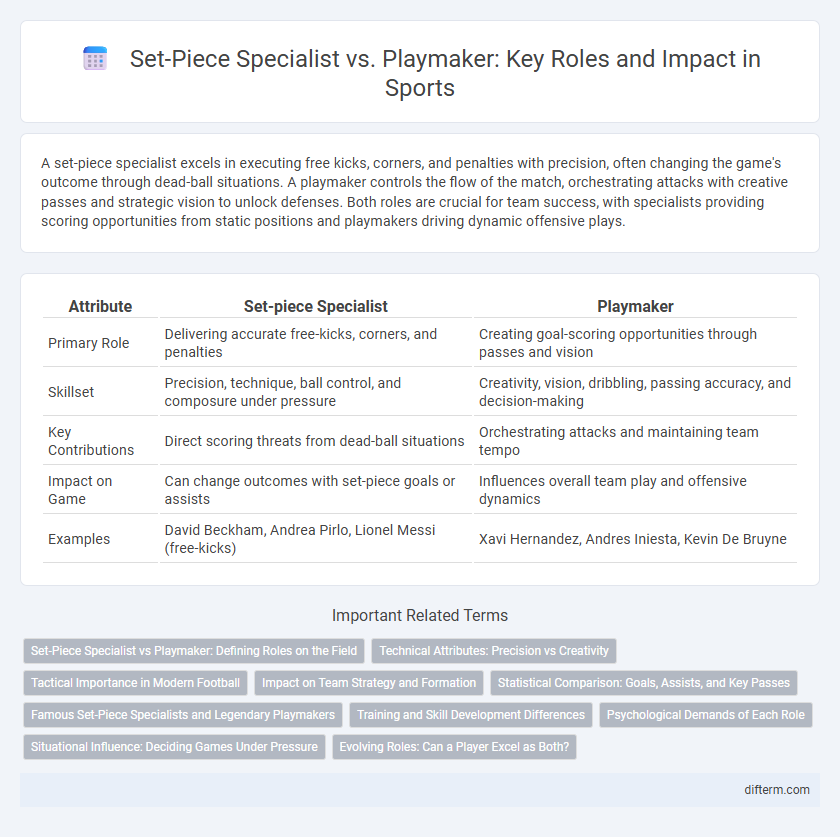A set-piece specialist excels in executing free kicks, corners, and penalties with precision, often changing the game's outcome through dead-ball situations. A playmaker controls the flow of the match, orchestrating attacks with creative passes and strategic vision to unlock defenses. Both roles are crucial for team success, with specialists providing scoring opportunities from static positions and playmakers driving dynamic offensive plays.
Table of Comparison
| Attribute | Set-piece Specialist | Playmaker |
|---|---|---|
| Primary Role | Delivering accurate free-kicks, corners, and penalties | Creating goal-scoring opportunities through passes and vision |
| Skillset | Precision, technique, ball control, and composure under pressure | Creativity, vision, dribbling, passing accuracy, and decision-making |
| Key Contributions | Direct scoring threats from dead-ball situations | Orchestrating attacks and maintaining team tempo |
| Impact on Game | Can change outcomes with set-piece goals or assists | Influences overall team play and offensive dynamics |
| Examples | David Beckham, Andrea Pirlo, Lionel Messi (free-kicks) | Xavi Hernandez, Andres Iniesta, Kevin De Bruyne |
Set-Piece Specialist vs Playmaker: Defining Roles on the Field
Set-piece specialists excel in delivering precise free kicks, corners, and penalties, directly influencing goal-scoring opportunities through their expertise in dead-ball situations. Playmakers control the game's tempo by orchestrating attacking plays with vision, passing accuracy, and creativity, linking midfield to offense. Both roles are critical but distinct: set-piece specialists provide direct scoring threats from static positions, while playmakers facilitate dynamic, open-play opportunities for the team.
Technical Attributes: Precision vs Creativity
Set-piece specialists excel in delivering pinpoint accuracy during free kicks, corners, and penalties, leveraging exceptional ball control and technique to convert scoring opportunities. Playmakers demonstrate superior creativity and vision, orchestrating attacks with innovative passes and unpredictable maneuvers that unlock defenses. Technical attributes of precision define set-piece effectiveness, while creativity underpins the playmaker's ability to influence game tempo and generate scoring chances.
Tactical Importance in Modern Football
Set-piece specialists provide teams with tactical advantages by delivering precise free kicks, corners, and penalties that can break deadlocks and exploit defensive weaknesses. Playmakers control the game's tempo through creative passing and vision, orchestrating attacks and unlocking opposition defenses with strategic distribution. Their combined roles enhance a team's offensive versatility and are pivotal in modern football's tactical frameworks.
Impact on Team Strategy and Formation
Set-piece specialists shape team strategy by providing reliable scoring opportunities from dead-ball situations, influencing formations to favor wide players and aerial threats. Playmakers dictate the flow of the game through creative passing and vision, prompting formations that emphasize midfield control and fluid attacking movements. Teams often balance these roles by adapting tactics to leverage set-piece efficiency without compromising dynamic playmaker-driven build-up.
Statistical Comparison: Goals, Assists, and Key Passes
Set-piece specialists exhibit higher goal conversion rates from direct free kicks and corners, with an average of 12 goals per season, surpassing playmakers who score around 7. Playmakers dominate in assists and key passes, averaging 18 assists and 85 key passes per season compared to set-piece specialists' 9 assists and 40 key passes. This statistical contrast highlights set-piece specialists' efficiency in scoring opportunities, while playmakers excel in creating goal-scoring chances through open play.
Famous Set-Piece Specialists and Legendary Playmakers
Famous set-piece specialists like David Beckham and Andrea Pirlo excelled in delivering precise free-kicks and corners, turning dead-ball situations into scoring opportunities. Legendary playmakers such as Xavi Hernandez and Zinedine Zidane dominated midfield control with extraordinary vision, creating goal-scoring chances through expert passing and ball distribution. Both roles are crucial in football strategy, with set-piece specialists directly impacting goal conversion and playmakers orchestrating overall offensive flow.
Training and Skill Development Differences
Set-piece specialists focus on precise techniques such as free kicks, corners, and penalties, requiring repetitive practice to perfect ball placement, curve, and power. Playmakers develop spatial awareness, vision, and decision-making skills through drills emphasizing passing accuracy, quick thinking, and movement off the ball. Training for set-piece experts often involves isolated scenarios, while playmakers work in dynamic, team-oriented situations to enhance creativity and game management.
Psychological Demands of Each Role
Set-piece specialists require intense concentration and precision to execute free kicks and corners under pressure, relying heavily on routine and mental resilience to maintain consistency. Playmakers face complex psychological demands as they must quickly interpret the evolving game landscape, make split-second decisions, and manage team dynamics while maintaining creativity and composure. The mental toughness in set-piece execution contrasts with the adaptive cognitive flexibility demanded from playmakers during continuous play.
Situational Influence: Deciding Games Under Pressure
Set-piece specialists excel in high-pressure moments by delivering precise free-kicks and corners that can directly alter the scoreboard, often converting crucial scoring opportunities in tight matches. Playmakers influence game flow by controlling tempo and creating scoring chances through vision and creativity, shaping pivotal moments during sustained offensive pressure. Their situational impact depends on the context, with set-piece specialists thriving in dead-ball scenarios and playmakers dominating open play transitions to decide critical games.
Evolving Roles: Can a Player Excel as Both?
Set-piece specialists provide crucial dead-ball precision, often determining game outcomes through free-kicks and corners, while playmakers excel in orchestrating open play with vision and passing creativity. Modern football tactics increasingly demand players to blend these roles, enhancing team unpredictability and fluidity in attack. Examples like Kevin De Bruyne demonstrate how mastery in both set-piece execution and dynamic playmaking elevates a player's impact on the pitch.
Set-piece specialist vs playmaker Infographic

 difterm.com
difterm.com